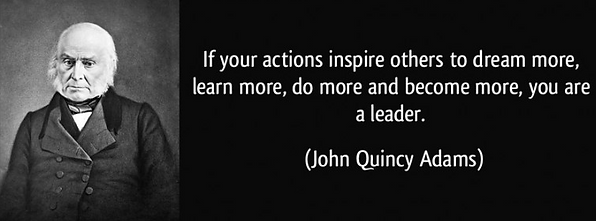STEP BACK TO GO FORWARD
"Where do you see yourself in 5 years?" Is not an uncommon interview question. Unlike most educators, I am beginning my career as an administrator and looking to 'take a step backwards' to become a classroom teacher. My goal is to someday have my own classroom where I can combine my love of mathematics and technology to prepare students for their futures. I feel like this is where I can have the most positive effect on future generations. In 5 years I see myself as a successful classroom teacher who is a district technology leader while continuing to learn everyday.
Subject Area Goals
Continuing education is not limited to advanced degrees and certifications. Jim Moulton says practicing your craft is an essential way to become a life long learner. In his Edutopia article 'It's important to Practice What We Teach' Moulton refers to art teachers, many of whom are artists in their own time as having an ideal relationship with their students. Art teachers are both the apprentice and the master in their craft. He suggests science teachers should be performing research projects at home, business teachers should be entrepreneurs and literature teachers should be writers themselves.
I am currently more successful at achieving this in my education minor, Physical Education, than my major, Mathematics. I workout, jog and play soccer in my personal life but in order for me to be a better math teacher, mathematics should play a more active role in my personal life too. More than just calculating the best deal at the supermarket I mean. Moulton suggests math teachers could be engineers or treasurers but I can see myself as a statistician. Although I do not want to limit myself, one thing that is clear is that there should be a role for math in my personal life in order for me to be a successful teacher.

Technology Goals
Upon entry into the Michigan State University Master of Arts in Educational Technology program (MAET), I thought my goal was to learn about every single type of technology 'out there' so that they could be used in my classroom. I have since learned that effective technology implementation is so much more than that. It's not about the most expensive new device or latest software. Some of the most effective technologies for students can be simple adaptations of classic games with outdated graphics. Two of the most important aspects of technology integration are accessibility to students and supporting curricular goals.
The MAET program has provided me with the knowledge to learn how to use new and old) technology, hardware and software. If I had only learned how to use the technologies available at the time of my program, I would have been done a great disservice so I am grateful that I have been provided with the tools to teach myself and hence be a lifelong learner. Technology is evolving so fast that I need to try to stay ahead of my students technical knowledge after completing MAET I feel confident of doing that.

Leadership Goals
In a Harvard Business Review article, Rooke and Torbert claim that there are Seven Transformational
Leadership Styles. My goal is to be the individualist type of leader. This is the type of leader who balances the needs of themselves and their environment. Although this style can be the "source of tension" it can also spark "creativity and a growing desire for further development". I think I already demonstrate some of the traits associated with this leadership style such as the awareness of possible conflict and the ability to communicate well with colleagues who have opposing ideas. One characteristic that I hope to provide in future is to "contribute unique practical value to [my] organization".
I aim to become a leader in my classroom, school, and district. Personally I feel like a leader does not need to hold a position of authority but can lead by example. A measure of good leadership can be for colleagues to follow my example, not because they have to but because they see the benefits. I think my education and experiences have provided me with the tools and resources to guide my future students, colleagues and district in a world where technology drives us forward.
References
Moulton, J. (2009). It's Important to Practice What We Teach. Edutopia. http://www.edutopia.org/lifelong-learning-apprenticeship
Rookie, D., Torbert, W. (2005). Seven Transformations of Leadership. Harvard Business Review. https://hbr.org/2005/04/seven-transformations-of-leadership
Image Sources:
Quotes About Education From Gandhi. (n.d.). [digital image]. Retrieved from Quotesgram
John Qunicy Adams Quotes. (n.d.). [digital image]. Retrieved from Quoteaddicts